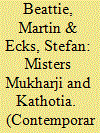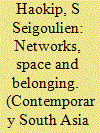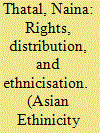| Srl | Item |
| 1 |
ID:
177937


|
|
|
|
|
| Summary/Abstract |
This article reflects on the meanings of money in the lives of two very different people from Kolkata. Mr Mukharji, a 60 year-old Bengali man, was a branch manager of a state bank who devoted his life to Tantrik Yoga. Mr. Kathotia, a Marwari man, was a wholesale paper dealer, with an interest in stamp and coin collecting. After first developing a theoretical framework on the sociology of money, the authors go on to describe their encounters with these two people, their different ethnic belongings, their social and working lives and what matters to them in life.
|
|
|
|
|
|
|
|
|
|
|
|
|
|
|
|
| 2 |
ID:
192861


|
|
|
|
|
| Summary/Abstract |
This article aims to supplement existing economic analyses of the Marwari mercantile network by exploring how the network is both grounded spatially and reproduced culturally in Manipur. It discusses some of the economic and socio-cultural practices adopted by the Marwari merchants in Manipur including their business activities, marriage patterns and temple construction. In so doing, it highlights the nature of relationships between these practices and how they are connected to their mercantile network at large. The article also illustrates how merchant communities such as the Marwaris carve out their own space through cultural processes of place-making in a contested place like Manipur. Elucidating how the Marwari mercantile network gets reproduced culturally, it reveals the ways in which networks of capital relate to distinct spatial configurations – in this case, borderland. In turn, the above process also delineates how the idea of belonging for the Marwari merchants is emplaced and shaped at the same time by their mercantile network. Based primarily on interviews, observation and some documents, the materials used in this article stem mainly from Imphal and some from Churachandpur.
|
|
|
|
|
|
|
|
|
|
|
|
|
|
|
|
| 3 |
ID:
177556


|
|
|
|
|
| Summary/Abstract |
‘Old Settlers’ is a name that people commonly known as ‘Marwari’ and others ‘Sikkimese of Indian origins’ have adopted for themselves following 2008 Amendment 26AAA, which exempted from income tax Sikkim Subject Certificate holders; ‘Sikkim Subject’ status was the form of citizenship granted during the monarchy, and it remained basis of access to citizenship rights after the inclusion of Sikkim into India in 1975. Whereas some of their families had settled in the nineteenth century, which would have qualified them for Sikkim Subject status, Marwaris living in Sikkim were not given this status. Why ‘old settlement’ became central to their claims after 2008? This paper analyses the emergence of label ‘old settlers’ as an outcome of the specific connection in Sikkim between formal recognition as an ethnic minority and distribution of state benefits, and of increased importance given to a territorial form of recognition after 1975.
|
|
|
|
|
|
|
|
|
|
|
|
|
|
|
|